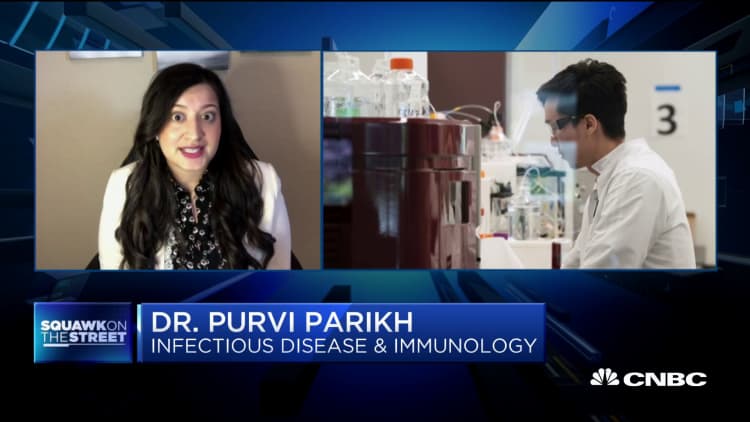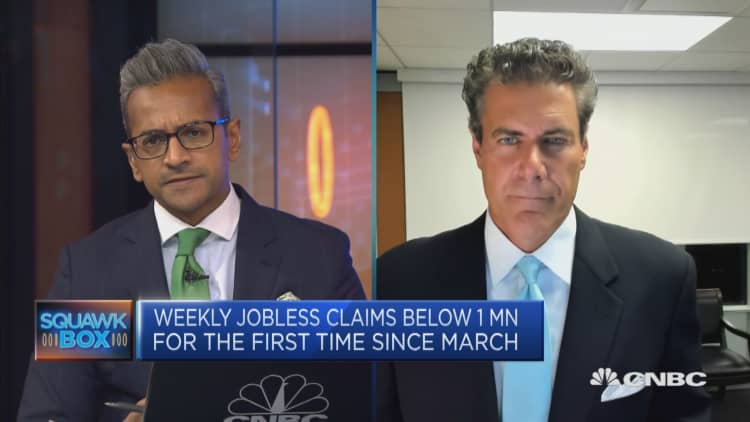The U.S. has doled out billions to develop a vaccine against the coronavirus that has infected more than 5.1 million people across the country, locking in a minimum of 800 million doses as soon as the immunizations are cleared later this year or early next year.
So far, the deals with a handful of pharmaceutical giants have topped roughly $10.79 billion as part of Operation Warp Speed, a program led by several departments within the federal government to accelerate the development, manufacturing, and distribution of vaccines and treatments to fight the coronavirus.
The operation aims to provide at least 300 million doses of a coronavirus vaccine by January 2021. In most of the agreements, the Department of Health and Human Services says the vaccines will be given to the American people for free if part of a vaccine campaign. Once the vaccines are approved, the campaign is intended to quickly deliver them to as many people as possible. The federal government has said it will cover the cost of delivery but health-care providers can charge to administer the vaccine.

"It is likely that at the beginning of next year we would have tens of millions of doses available," Dr. Anthony Fauci, director of the National Institute of Allergy and Infectious Diseases, told reporters on a conference call alongside National Institutes of Health Director Dr. Francis Collins on July 27.
"I think as we get into 2021, several months in, that you would have vaccines that would be widely available," Fauci said.
Experts say some of the top vaccine candidates are already being manufactured "at risk," meaning the doses are created and prepared for deployment before official approval from the U.S. Food and Drug Administration.
"We are investing in the development and manufacture of the top six vaccine candidates to ensure rapid delivery. The military is ready to go, they're ready to deliver a vaccine to Americans as soon as one is fully approved by the FDA and we're very close to that approval," President Donald Trump said during a news conference at the White House on Tuesday.

The U.S. is only obligated to pay the next tranche of funding if the vaccines are cleared by the Food and Drug Administration.
Here's where the deals stand so far:
Moderna
- Trump said Tuesday that the U.S. government reached a deal with Massachusetts-based Moderna for 100 million doses of its leading vaccine candidate mRNA-1273.
- The deal gives the federal government the option to purchase up to 400 million additional doses, according to a separate announcement from Moderna. The company said the deal is worth up to $1.53 billion.
- The U.S. has already invested $955 million in Moderna's vaccine development, bringing its total investment up to $2.48 billion, the company said.
- Moderna's vaccine candidate is in late-stage human trials. The company previously said it could expect results as early as October.
Johnson & Johnson
- HHS announced on Aug. 5 that it reached a deal with Janssen, J&J's pharmaceutical subsidiary, worth approximately $1 billion for 100 million doses of its vaccine.
- The deal gives the federal government the option to order an additional 200 million doses, according to the announcement.
- The U.S. earlier this year awarded J&J $456 million to develop its vaccine.
- J&J's experimental vaccine is currently in early stage human trials and is expected to begin late-stage human trials in September, executives have previously said.
Sanofi and GlaxoSmithKline
- Sanofi and GSK, which are co-developing a vaccine, announced July 31 that HHS would pay up to $2.1 billion to develop and deliver 100 million doses of their potential candidate.
- The U.S. will have the option to order an additional 500 million doses, the companies said.
- More than half of the $2.1 billion investment will be used for further development of the vaccine while the remaining funds will be used toward manufacturing the initial 100 million doses, the companies said.
- Sanofi and GSK have previously predicted their vaccine will enter clinical trials in September and late-stage trials by the end of the year.
Pfizer and BioNTech
- Germany-based BioNTech and Pfizer announced July 22 that the U.S. agreed to buy 100 million doses of their potential coronavirus vaccine for up to $1.95 billion.
- The agreement allows the U.S. to acquire an additional 500 million vaccine doses, the companies said.
- BioNTech and Pfizer are jointly working on four vaccine candidates. The most advanced, called BNT162b1, began late-stage human trials in late July.
- The companies said they aim to make up to 100 million doses by the end of 2020 and approximately 1.3 billion doses by the end of 2021.
Novavax
- HHS announced July 7 that it reached a deal with the Maryland-based drugmaker Novavax worth $1.6 billion to help the company with trials and manufacturing.
- The federal government said as part of the deal Novavax will provide the U.S. with 100 million doses of its experimental coronavirus vaccine.
- Novavax's vaccine, named NVX-CoV2373, generated a promising immune response in an early stage clinical trials and could begin late-stage trials as early as October.
- The company said it hopes to begin delivering 100 million vaccine doses by the beginning of next year.
AstraZeneca
- HHS announced May 21 that it would pay AstraZeneca up to $1.2 billion for its experimental vaccine developed alongside researchers at the University of Oxford.
- The U.S. will receive at least 300 million doses of the vaccine as part of its investment, HHS said.
- In June, the U.K.-based company said it's working to deliver 2 billion doses of its vaccine, called AZD1222, and could begin distributing doses in the fall.
- The company announced promising early stage human trial results on July 20 and has begun late-stage human trials in the U.K., Brazil and South Africa.
— CNBC's Berkeley Lovelace Jr. and Lucy Handley contributed to this report.


